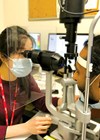Dr Rajan Sondh talks about medical electives and how he believes they are an opportunity to explore career interests, giving undergraduates an opportunity to develop skills in areas that they wouldn’t normally encounter on placements.
Typically, electives are taken abroad, but during my elective period, I was only able to take this placement locally due to the COVID-19 pandemic. My elective took place at my local ophthalmology department, and I wish to share some of the experiences I developed during my five weeks at the hospital.
My first week started off with an induction to the department which involved a tour of the facilities available. There was exposure to equipment I had never encountered during my medical school placements – my experience in medical school consisted of two days of placement – one day in theatre observing cataract surgery and the other day shadowing in a general ophthalmology clinic.

Following our induction, we were handed our timetables which were designed to expose us to clinics, theatre sessions, and many subspecialties in ophthalmology, including:
- vitreoretinal surgery
- cornea
- cataract
- adnexal
- neuro-ophthalmology
- glaucoma
Vitreoretinal surgery
Vitreoretinal surgery exposure included observing in theatre. An example of a case I saw was vitrectomy in a patient who had developed retinal detachment. This is a sight-threatening condition that requires urgent treatment. The patient was operated on and made a full recovery.
Cornea
Involving clinics and theatre sessions, this specialty deals with ocular conditions that affect the front of the eye. One patient was unfortunately a victim of an assault that resulted in him being attacked with chemicals that had burned his corneas. As a result, he needed a corneal transplant. The surgery required meticulous skill to remove the damaged cornea and replace it with a donated cornea, which took hours of the surgeon’s concentration, whilst making the smallest of movements to ensure each suture was placed correctly to reduce post-operative complications.
Cataract
I was able to attend a complex cataract list. Cataracts that are complex can sometimes be extremely dense and can increase the chance of complications. Unfortunately, for this patient, they suffered from a posterior capsular rupture requiring an anterior vitrectomy to be performed. Once this was completed, the intraocular lens was implanted, and the patient was able to go to recovery.
"Ophthalmology is competitive, but throughout the foundation programme there are countless opportunities to further one’s experience, helping to build a significantly stronger application."
Adnexal
Adnexal or oculoplastics is the specialty that treats conditions that surround the eye. For example, one patient presented with consistent tearing of the eye. Despite medical management (which focussed on reducing the amount of tearing or unblocking the tear ducts) the patient was referred to surgery to have a dacryocystorhinostomy which allows for a new tear drainage system to be made to help drain the tears more efficiently so that symptoms are relieved.
Neuro-ophthalmology
This involved seeing patients with squints and observing them being treated in theatre by resection or recession of the extraocular muscles. This intervention allows the patient’s squint to be alleviated which improves their quality of life.
Glaucoma
My time in glaucoma theatres gave me exposure to patients requiring surgery to correct their high intraocular pressure. One patient required a trabeculectomy, a fine microsurgical procedure that allows intraocular fluid to drain more easily, lowering the pressure inside the eye and alleviating symptoms.
Miscellaneous
The elective also showed me other specialist interventions, such as watching ophthalmologists perform intravitreal injections. This allows for the medication to act directly at the site of the medical condition. An example of this includes anti-VEGF which is used to treat neovascularisation in conditions such as age-related macular degeneration.
Skills learned
One important skill I learned was the use of a direct ophthalmoscope and a slit lamp. These are both devices that allows the doctor to examine the eye in closer detail. Direct ophthalmoscopy is an important skill for foundation doctors and medical students to be able to do as it is commonly used in cranial nerve examination and eye examinations when clerking patients.The skill of a slit lamp takes much longer to master, but early exposure on how to use a slit lamp will greatly aid any doctor who is hoping to pursue a career in ophthalmology.
Conclusion
Overall, this local elective exposed me to the vast subspecialties in ophthalmology, giving me as a student a realistic perspective to what conditions are managed under the specialty. It also allowed me to develop skills that I can take forward into the foundation programme and familiarity on different equipment used to diagnose ophthalmological conditions. Furthermore, experiences like this can influence decisions to explore specialties further. Ophthalmology is competitive, but throughout the foundation programme there are countless opportunities to further one’s experience, helping to build a significantly stronger application.
TAKE HOME MESSAGES
-
Local electives are great for exposing oneself to different specialties and equipment.
-
Local electives are one of many opportunities to further education through foundation programmes.
-
Local electives have the potential to offer significantly more practical experience than medical school placements.
Declaration of competing interests: None declared.
COMMENTS ARE WELCOME









